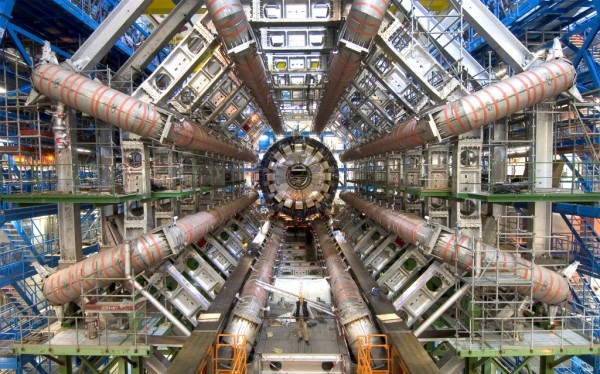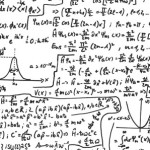Have We Discovered the God Particle?
by Stephen M. Barr
Filed under Science
In recent months, the world has buzzed with the discovery of the Higgs particle. But is it really what Joe Biden would describe as a big...deal?
Yes and no. It is a milestone, but not a breakthrough. It is the culmination of an enormous international effort over many years. However, the Higgs particle was predicted to exist by a theory that has passed many precise tests, and so it would have been a shock had it turned out not to exist. Therefore, unless the Higgs is discovered to have unexpected properties, simply finding the Higgs will not unlock any secrets.
What is the Higgs particle? It is an “elementary excitation” of the “Higgs field.” (Yes, the word ‘excitation’ is used in physics, not just in a Beach Boys song!) All of space is permeated by “fields.” They are the basic stuff of nature: all the matter and forces in the world are aspects of these fields. There are many kinds of them: electromagnetic fields, gravitational fields, electron fields, neutrino fields, quark fields, and so on. In our present theory, the Standard Model of particle physics, there are 18 types of fields, though there are many reasons to believe that others, as yet unknown, exist.
Fields give rise to forces. For instance, magnetic forces are due to the magnetic fields. A compass needle tells you in what direction the magnetic field in a particular place is pointing. Besides pushing on things, fields can have waves in them. For instance, light waves, radio waves, microwaves, etc. are all waves in the electromagnetic field. But one of the mysterious things that quantum mechanics tells us is that the waves in these fields can also be thought of as particles.
So the Higgs particle is the smallest amount (or “quantum”) that you can have of a wave in the Higgs field.
But there are 18 kinds of fields (and particles) in our present theory, so what’s so special about the Higgs field and the Higgs particle? First, Higgs particles were the only particles in the Standard Model that hadn’t yet been produced in the laboratory. Second, the Higgs field gives mass to many other types of particle. Other fields vary a lot in strength from place to place—magnetic fields are stronger close to a magnet than far away, for instance. The gravitational field is stronger near the sun than near the earth. But the Higgs field has an almost constant strength throughout the universe—and that strength is huge compared to that of any other known field almost anywhere in the known universe. Being immersed in this strong Higgs field is what gives most other particles their masses.
One of the biggest unsolved problems in physics is why the Higgs field has the strength it does. While it is certainly much stronger than the other fields we know about, theoretically one would expect it to be vastly stronger still—indeed, about 1017 (= 100,000,000,000,000,000) times stronger than it is. Why? Because there are certain known effects that would tend to make it that strong. So it seems that there must be some other, as yet unknown effects that almost exactly cancel the known effects to give the Higgs field the strength we actually see. That seems incredibly bizarre to theorists. For almost 40 years they have been wondering what those other effects are. Finding out is the real goal of the Large Hadron Collider (LHC) and truly would be a huge breakthrough with enormous theoretical payoffs.
The main contender for those “other effects” is based on an idea called “supersymmetry". If it is right, then every known particle would have a new kind of particle associated with it. For example, electrons would be associated with much more massive particles called “scalar electrons.” In effect, these new particles would cancel the effects on the Higgs of the known particles. What most particle physicists are hoping and expecting to see at the LHC is evidence for these new particles—or some other new effect that explains why the Higgs field has the strength it does.
What if no such new effect is seen? What if the only thing found at the LHC is the Higgs particle? It would be a disaster for fundamental physics. It would mean that the LHC was a flop.
One last thing: Why do journalists—not physicists—call the Higgs particle “the God particle”? It is because Leon Lederman, a Nobel-prize winning physicist, wrote a book in which he wanted to call the Higgs particle the “god-damn particle,” because it was so hard to find. Apparently his publishers thought “God particle” would sell better. So, thanks to the idiocy of publishers, we have to suffer one of the most inane pieces of media hype in history. Does the Higgs have anything to do with how the universe began? No. Is it the holy grail of physics? No. Is it the "God particle? No. But its discovery is, for those of us interested in particle physics, something to celebrate.
Related Posts
Note: Our goal is to cultivate serious and respectful dialogue. While it's OK to disagree—even encouraged!—any snarky, offensive, or off-topic comments will be deleted. Before commenting please read the Commenting Rules and Tips. If you're having trouble commenting, read the Commenting Instructions.













